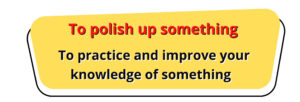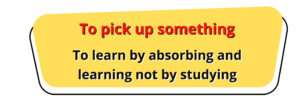Since you start reading this article, you decided to set foot on the long road of learning English. Therefore, you are considered an English student now. Congratulation! In order for you to be able to talk about your school life and study path, I’ve prepared a set of useful studying and exams phrasal verbs that you can learn to level up your English knowledge. Let’s get into it.
Studying & exams phrasal verbs in English
1. To keep up with….
As a normal part of student life, we are always dealing with exams. Therefore, in order to pass the exams successfully, what should you do? Should I take it easy now and leave everything to night of exam? Or perhaps you should keep up with your studies.
To keep up with something means to continue doing something. In this case, keeping up with your studies means studying during the semester and not keeping everything for the last night before the exam. As long as you keep up with your studies, you will have less to read the night before the exam, so you can sleep tight that night! That is the first phrasal verb about studying and exams.
2. To brush up on…
This time you have studied really hard and you are ready to nail the exam (= do very well in the exam). But since there may be some small slippery details (= details you may have forgotten), you need to brush up on the topics that you might have forgotten.
To brush up on something means to review and to learn something that you have studied in the past and you might have forgotten now.
For example, maybe a few years or a few months ago you learned some English tenses or English vocabulary and now you remember some of them, and have forgotten the rest. In this case, what you have to do is to brush up on the vocabulary that you had learned before. It means you review them so that you learn them completely again. Notice that this phrasal verb about studying and exams has 2 particles: up & on (brush up on …).
3. Something comes up in the exam
Have you ever asked yourself why we bother to keep up with our studies and brush up on the things that we’ve learned? The answer is crystal clear; It’s because they might come up in the exam. And who doesn’t like to be the best student in the class and get a perfect A?
But do you know what this studying and exams phrasal verb means? Let me explain.
If a question or a subject comes up in an exam, it means they are asked in an exam and you have to answer them. For example:
- I spent weeks to study the most difficult part of the book, but it didn’t come up in the exam!
- Don’t forget to brush up on all the side-notes. They may come up in the exam.
- Do you think I should study the footnotes? I don’t think they will come up in the exam tomorrow!
Learn more: If you are interested in learning about English newspapers phrasal verbs and vocabulary, click on the link below:
4. To mug up on something
As there are good and bad in the world, there are hard-working and lazy students in a class. But do you know how lazy students manage to pass the exams?
Lazy students don’t like to spend time studying a difficult subject, so they usually mug up on the key points.
Now here is another brilliant phrasal verb that you can use to talk about studying and exams, but how? Let me explain:
To mug up on something means to try to learn the main points of a subject quickly, usually the night before the exam.
Imagine that I have a book and it’s 1000 pages and since I don’t have time and tomorrow is the big test, I just read the first page of every chapter. In this way, I only mug up on the key points that may come up in the exam.
5. To scrape through
Another characteristic of lazy students is that they don’t care about the grade they get. They just want to pass the exam and get over it. So they scrape through.
Scrape through means to succeed at doing something but barely. It means to pass the test but with the lowest mark. So imagine on a scale of 30 the lowest passing mark is 18 and you get 18. In this case, you passed the exam but since your mark is the lowest possible, you just scraped through.
Learn more: Do you know about problem solving phrases and phrasal verbs? Read the article below:
problem solving phrases
6. To swot up on something
Those who want to scrape through and pass the test with the lowest mark possible, just swot up on everything the night before the exam. What does this phrasal verb about studying and exams mean?
To swot up on something means to learn as much as you can about something. Consider this: It’s the night before the exam and you haven’t studied anything and you are not prepared for the test. But you want to scrape through and pass with the lowest mark. So you swot up on everything and you learn a lot of things in a very short time period.
7. To polish up something
Let’s get back to the hard-working students again. In contrast with lazy students, hard-working students always want to achieve the best grade. So they polish up the most important topics during the semester.
To polish up something means to practice and improve your knowledge of something. So, during the semester, you polish up on everything your teachers and professors teach you so that you pass the test with the highest score possible.
8. To pick up something
Some students think that they can pass the tests with what they have picked up during the semester. What does picking up something mean?
This phrasal verb means to learn something by hearing and absorbing it but not studying and reading. For example, you are sitting in your class and the teacher is speaking. What you will remember of that class is what you have picked up. So you haven’t read any books or haven’t studied any notes. You only remember what the teacher taught you in class. That is what you have picked up.
Some students think they can pass the exams just with what they have picked up! However, as it turns out, it’s not going to happen. The key to success is to study very carefully and to keep up with the studies during the semester.
Learn more: A complete list of the traveling phrasal verbs in English
In this lesson, we learned about studying and exam phrasal verbs. As you know, phrasal verbs are an important part of the English language. It’s important to know these verbs and use them in our conversations.
Our online English course is an online class that will help you learn about the most common phrasal verbs and take your English to the next level. Take this course and enjoy learning English.
Summary of studying and exam phrasal verbs
Let’s review the 8 studying and exam phrasal verbs that we have learned so far:
| Phrasal verbs | Definitions |
| To keep up with your studies | to study continuously during the term. |
| To brush up on something | to review the things that you have studied in the past but might have forgotten. |
| Something comes up on the exams | those topics and questions are being asked. |
| To mug up on something | to only study the key and important points about something usually the night before the exam. |
| To scrape through | to be successful at something but barely/ to achieve the minimum requirement of something and not perform greatly. |
| To swot up | to learn as much as you can about something in a short time. |
| To polish up something | to improve your knowledge of something and to practice it a lot. |
| To pick up something | to learn by absorbing and hearing and not by studying. |
How to use studying & exam phrasal verbs in English
If you want to improve your knowledge of vocabulary or learn phrasal verbs, what you have to do is to learn them in context. That’s why we are going to see all of the things that we have learned in this articls in a short story:
I think I’m a great student. I always keep up with my studies during the term and I never mug up on the important point just the night before and hope that only they will come up.
Of course, the night before is important, but it is not the time to swot up on everything. It is time to brush up on the things that you might have forgotten.
Many students think that only by what they have picked up during the term, they can achieve great results. Well, they may scrape through but they won’t get great marks.
You have to polish up the most important topics during the term and not the night before.
And this is the and of this topic and this lesson, I hope you’ve learned all these studying and exam phrasal verbs.














 I think I’m a great student. I always keep up with my studies during the term and I never mug up on the important point just the night before and hope that only they will come up.
I think I’m a great student. I always keep up with my studies during the term and I never mug up on the important point just the night before and hope that only they will come up.





